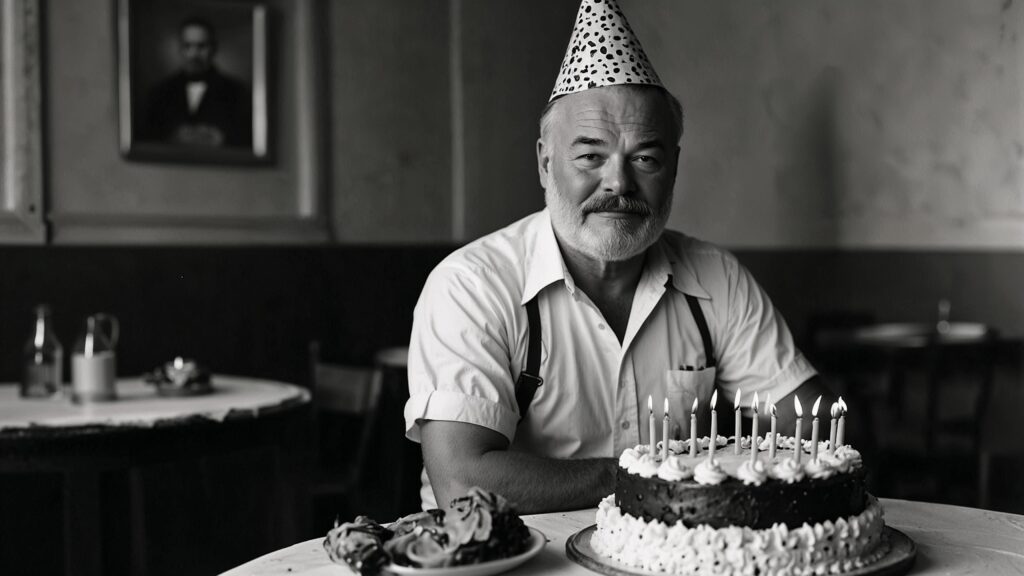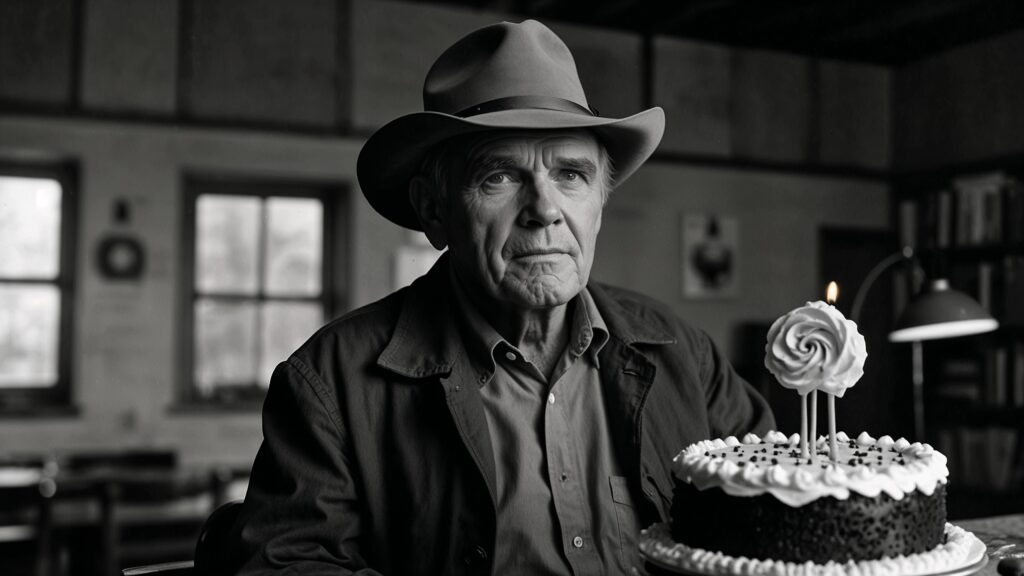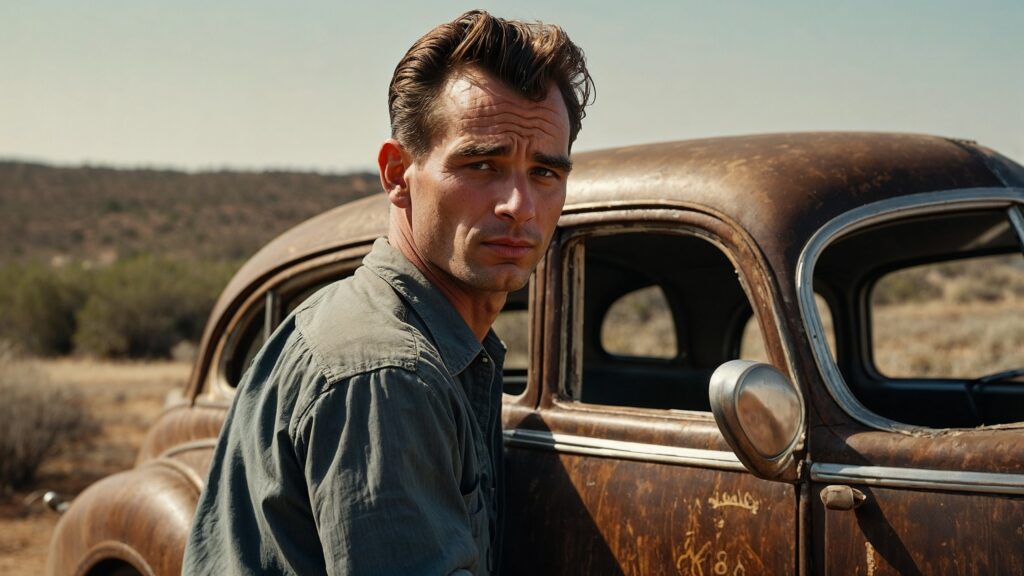
Watching The Greasy Strangler is like being locked in a sauna with a deranged performance artist who’s determined to make you laugh, cry, and question your life choices—all while slathered in a thick coat of Crisco. It’s not just a movie; it’s a goddamn endurance test. It’s a test of your mental fortitude, your gag reflex, and your ability to embrace the truly bizarre. And in the weirdest ways, it might be a masterpiece. It’s a 93-minute assault on your senses, your dignity, and your ability to keep a straight face while watching a grown man slather himself in Crisco and murder people, then step into an almost violent carwash whilst totally nude to clean up after the fact. It’s like if John Waters and David Lynch decided to make a baby and then left that baby to be raised by Troma Entertainment. And I’ve gotta say, I loved every ridiculous second of it.
The plot, such that it is, kicks off with Big Ronnie and his son, Big Brayden, who live together in an awful suburban hovel, in their underwear, introduced as Disco Walking Tour guides who wear matching pink turtlenecks and show their customers local landmarks that were significant in the history of disco (these landmarks are all fictional, seemingly made up on the spot by Big Ronnie). Big Ronnie and Big Brayden share an extremely unhealthy relationship, and an even unhealthier diet. If the phrase “Would you like some grease with that?” ever needed a visual representation, this is it.
The oily affair begins when Big Ronnie, who has an unexplained proclivity for getting slicker than a used car salesman at a water park, claims to be the titular Greasy Strangler, to which Brayden responds by accusing his father of being a “bullshit artist.” [Accusations of bullshit artistry are a recurring theme in this movie). Ronnie goes from zero to greasy faster than you can say, “two thousand bottles of baby oil.” After dousing himself in the oleaginous ooze, Ronnie strangles the life out of anyone unlucky enough to cross his slippery path.
At this point, it’s probably worth mentioning the soundtrack: it is weird as fuck, thus making it perfect for this movie. The soundtrack was composed by Andrew Hung, a renowned British musician, and was released on October 7, 2016. It is this reviewer’s opinion that Andrew Hung, however lovely a person he might be, should be shot in the balls for crimes against musicality. That said, it must also be admitted that Andrew Hung has had vastly more success in composing music than the reviewer has, prompting the question, “What the fuck does Jayson know about soundtrack composition wince he hasn’t sold a single CD?” Which is a perfectly reasonable question that I cannot reasonably answer. But I’m the one writing this review and would gladly debate anybody about the nightmarish and perverse qualities of this soundtrack.
Some notable tracks from the soundtrack include, “Brightly Coloured Pills,” “Get on the Greasy,” Go Home to My Bed,” “Gulp!,” “You Didn’t List, Oh No,” and “Amulet.”
It’s worth noting that the LP edition was limited to 1000 copies. It’s also worth noting that Andrew Hung’s compositions for the film have been praised by various musical perverts for their originality and fitting accompaniment to the film’s eccentric narrative. And so much for that. Now, back to the plot.
Quick cut to Big Ronnie and Brayden meeting up with the poor participants of their Disco Walking Tour. Big Ronnie points to a random doorway claiming it was in this very doorway that the Bee Gees wrote the lyrics to “Night Fever.” The walking tourists immediately get into a series of skeptical arguments about the veracity of Big Ronnie’s disco claims, and the absolute necessity of free drinks.
It’s this last bit that warrants further attention and, perhaps, deeper analysis: for my money, it might be the best scene in the movie. The scene unfolds when one of the disco tourists, a man with a thick accent, repeatedly interrupts to demand the free drinks that were promised in the tour’s promotional material. His insistence grows increasingly desperate, and the repetition of “Free drinks! Free drinks!” quickly becomes a mantra of absurdity for the whole group. Of course, in true Greasy Strangler fashion, the scene takes the mundane frustration of unmet expectations and cranks it up to eleven, turning it into a grotesque spectacle of awkwardness and absurdity.
Big Ronnie, naturally, responds with his trademark blend of disdain and delusion, dismissing the tourists’ complaints with the wave of his greasy hands. The whole exchange is a masterclass in anti-humor, where the joke isn’t in the punchline but in the sheer, unrelenting weirdness of the situation. And it makes me cackle.
Meanwhile, Big Brayden, the not-so-mini-me, falls for the bespectacled Janet, whose taste in men is as questionable as the food hygiene in the Ronnie household. And things just get weirder from there.
This far into the review, and I fear I’m not doing the in-depth analysis of this hour and a half of absurdity. First, let’s dissect our greasy duo. Big Ronnie is what you’d get if Colonel Sanders went on a bender with the Marquis de Sade at a lube factory. The guy’s a walking heart attack, a grotesque lothario who thinks “seduction” involves grinding his hips and repeatedly whispering sweet nothings like “hootie tottie disco cutie.” Big Brayden is pretty much Napoleon Dynamite got trapped in a vat of Vaseline. He’s a man-child in the most literal sense, with an Oedipal complex that Freud would need a chainsaw to cut through. Together, they’re like the Laurel and Hardy of sleaze – if Laurel and Hardy were prone to naked choke-outs and disco-drenched debauchery.
The performances are…well, they’re performances. Michael St. Michaels as Big Ronnie is a revelation, a man so committed to his role that you can almost smell the grease through the screen. Sky Elobar as Big Brayden is equally unhinged, delivering lines with the kind of deadpan sincerity that makes you wonder if he’s in on the joke or if he’s just as confused as the rest of us. And then there’s Elizabeth De Razzo as Janet, the love interest caught in the middle of this greasy love triangle, who deserves some kind of award for keeping a straight face throughout her scenes.
Full disclosure, dear reader: I’ve seen this movie several times at this point. Yesterday’s viewing was no less strange and bewildering than the first. And ultimately, I really don’t know what to make of this thing. The reptilian part of my brain wants to recoil in horror and label the whole thing as garbage. But that would be dismissive. One solid conclusion I’ve drawn from every viewing is that, say what you will about the movie, everything about it was deliberate. Unlike movies like “The Room” and others where the writer/director had some grand, lofty vision of what they were going to make, and then, due to stark budgetary realities or just incompetent filmmaking, the result had little or nothing to do with the original vision, I get the feeling that The Greasy Strangler is pretty close to exactly what the filmmakers intended to create. As weird as every single element of this movie is, it inarguably has a consistent aesthetic throughout. And there’s no getting around the fact that I and pretty much everyone I know who has seen the movie has watched it repeatedly.
Of course, The Greasy Strangler is not for everyone. It’s not even for most people. It’s a movie that revels in its own weirdness, that dares you to look away and then punishes you for not doing so. It’s gross, it’s offensive, it’s deeply, deeply stupid – and it’s also one of the funniest, most original movies I’ve ever seen.
So, if you’re the kind of person who enjoys a good cinematic trainwreck, who finds beauty in the grotesque, who laughs in the face of good taste and decency, this is the movie for you. Just don’t watch it on a full stomach. Or a first date. Or with your parents. Actually, just don’t watch it with anyone you respect, because they will never look at you the same way again.








